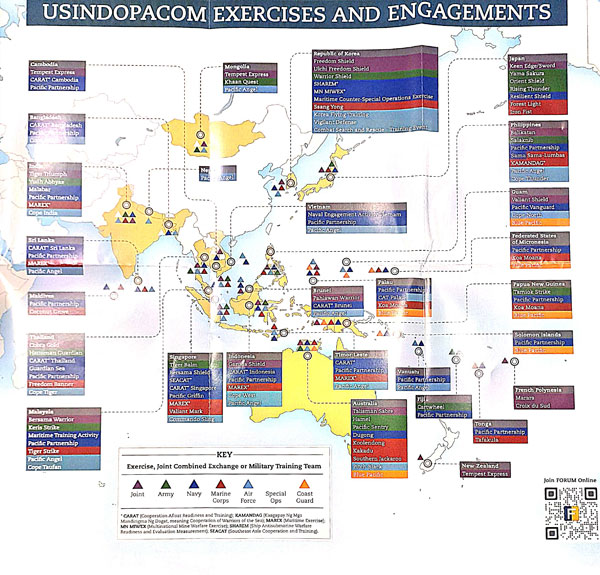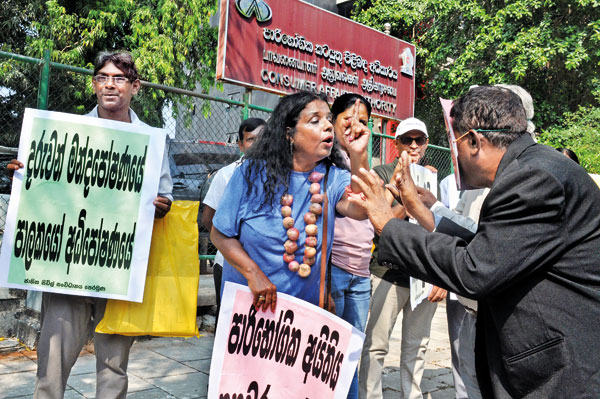Columns
Lanka identified as a partner in Indo-Pacific defence umbrella
View(s):Amid Sri Lanka’s denials of China’s plans to set up a military base on its soil, following such a claim in the 2024 threat assessment report by the US Intelligence Community, a recent issue of the Indo-Pacific Defense Forum, a US military magazine, has identified Sri Lanka as a partner in the Indo-Pacific defence umbrella.
The magazine in a special pullout titled “USINDOPACOM Force Locations, Exercises and Engagements,” has published an Indo-Pacific map outlining the type of military engagement the United States Indo-Pacific Command has planned to conduct with partner countries.
Under Sri Lanka, four types of military engagements are given: CARAT Sri Lanka, Pacific Partnership, MAREX and Pacific Angel. CARAT refers to Cooperation Afloat Readiness and Training. MAREX means maritime exercise. Pacific Angel
is a multinational
military exercise focused on humanitarian assistance and disaster relief.
The pullout also carries a write-up on a network of allies and partners. “The U.S.’s network of allies and partners is foundational to strategic and integrated deterrence in the Indo-Pacific. Deterrence is real and strong because the U.S. military remains the world’s most capable fighting force, and its allies and partners provide the greatest asymmetric advantage, built upon shared values, trust and respect. Alliances, multilateral arrangements, partnerships, friendships, and relationships are essential components of regional security,” the write-up explains.
It also says, “USINDOPACOM continues to strengthen all layers of this network through increased security cooperation, advanced training and complex, multilateral initiatives. These activities, in turn, increase interoperability, build capacity and enhance shared security, while reinforcing the rules-based international order and building theaterwide capabilities through information-sharing that strengthens alliances and partnerships.”
Also included as a partner is the Maldives, which has been improving its defence cooperation with China, since President Muhammad Muizzu took office in November last year. In keeping with a campaign promise, he asked an Indian military contingent operating an air ambulance service in a Maldivian atoll to leave the country. The Indian troops left the archipelago last week.
Of course, given the growing India-US military ties, India is slated for six different military exercises under the USINDOPACOM umbrella. Other South Asian countries included in the map are Bangladesh and Nepal.
Dishonourable doctorates at a high fee
More Sri Lankans are subjected to various forms of scams these days, ranging from fake crypto schemes, pyramid syndicates, and illegal migration, with racketeers exploiting the plight of the less privileged.
One such scam was about fake degree factories. An organisation that seemed to be operating from Sri Lanka offered ‘honorary doctorate degrees’ for fees. With a shady website, the organisation claimed to be operating from the United Kingdom and projected itself as “a complete virtual education provider.”
Notably, all domain names of official university websites operating from the UK registered their Uniform Resource Locator (URLs) as “.ac.uk”. However, this particular website ended with a mere “.uk”.
A concerned local individual called up the organisation to find out how he could secure an honorary degree while explaining his academic and work-related experiences over the years. The caller, on the other end, responded that it would cost around Rs 140,000 to get the degree, including charges for the convocation.
Interestingly enough, all the “honorary doctorate awardees” of the university listed on the website turned out to be Sri Lankans.
Bharat-Lanka housing project: Indian HC explains tender procedure
The fourth phase of the Bharat-Lanka housing project was launched recently to construct houses for the estate community.
In the second and third phases of the project, four implementing agencies, including the National Housing Development Authority (NHDA), were associated, but this time it was the NHDA along with the State Engineering Corporation (SEC) that was selected.
An Indian High Commission spokesperson said that for the selection, a tender was floated, and different entities, including those who were associated with the earlier phases, had responded.
The responses were evaluated on transparent evaluation criteria, and eventually, the NHDA and the SEC were selected, the spokesperson said.
Therefore, some of the implementing agencies involved in the previous phases had not been deliberately kept out, as reported in these columns on March 3.
Some 4,000 housing units were completed in the earlier phase, with the implementing agencies being the Sri Lanka Red Cross (SLRC), the International Committee of the Red Cross (ICRC), and the United Nations Human Settlements Programme (UN-Habitat).
Smart diplomatic strategy by JVP
A flurry of visits by diplomats to the JVP head office in Battaramulla has been witnessed in recent weeks.
The visits have increased since JVP leader Anura Kumara Dissanayake was invited for a visit to India.
Some of the visits have been on the initiative of the respective diplomatic missions.
Inquiries have revealed that the JVP has also extended invitations to the foreign mission to visit its office. Accordingly, some of the missions visited the party office in response to the invitations received.
“That seems to be a part of the smart campaign by the party,” one of the officials pointed out.

- Civil society activists staging the onion-garland protest
Here’s your dowry: A garland of big onions
Long gone are the days of formal greetings and engaging in small talk on politics when fellow Sri Lankans meet in public. Nowadays, the topic is heavily dominated by the cost of living and the prices of goods.
These days, in particular, the hot topic is the high prices of imported onions, soon after the recent skyrocketing prices of vegetables.
On Friday, marking World Consumer Rights Day, an outfit called the National Civil Organisation Front staged a protest in front of the Consumer Affairs Authority (CAA), demanding it protect the rights of citizens by ensuring affordable prices for goods and that illegal vendors who charged exorbitant prices be hounded out.
To portray the difficulties faced by the common people daily, the protesters were seen wearing garlands made of imported onions, which are priced at Rs 600- 800 in the market.
Protesters presented onion garlands to fellow protesters on the spot, saying, “Here is your dowry,” implying that it is one of the most precious items these days, and instructing them to handle the garland with care since each one is made with at least half a kilo of onions.
The protest went on for quite some time as media personnel covered the whole event, and later protesters made sure all garlands were well taken care of and left the scene.
Political support for a permit
With the presidential and parliamentary elections due, politicians have been gradually organising themselves to support their respective parties.
One of them, a former opposition leader of a local council in the Matale district, has written to the president’s office to say he would continue to extend support to President Ranil Wickremesinghe and the party.
However, he has appealed that due consideration be given so that he could obtain a permit for a liquor shop in Sigiriya or Makulugaswewa.
The request has been turned down, saying it has come to the wrong person.
Parliament oversight committee milks Trade Ministry dry
In recent times, senior government officials who testified before Parliament Select Committee meetings without being adequately prepared and submitting documents without contextual knowledge often end up as a laughing stock in the face of the media as those sessions are broadcast live.
One such incident unfolded last week when the Committee on Public Finance (CoPF), headed by Dr. Harsha de Silva, questioned a senior official attached to the Trade Ministry as to why the pricing formula for imported milk powder was not implemented.
The official was unaware whether the Trade Ministry or the Consumer Affairs Authority (CAA) is vested with regulatory powers about the price formula.
When Dr. de Silva questioned the high prices of imported milk powder in the market by saying, “Then where’s the price formula?” The official responded by saying, “There’s no price formula to be implemented. Dr. de Silva reminded him: “Why not? I made the price formula back in 2018.”
Dr. de Silva pointed out that the formula came into effect for implementation with the support of relevant stakeholders, including milk powder companies, the Treasury, the Central Bank, and the Auditor General. “If the world market price is decreasing, how can you sell milk powder for a higher price while making a substantial profit, and when was the price formula removed?” he asked.
The official responded, “I will have to check and tell you.”
Thereafter, the official proceeded to contact a CAA director, who told him that there was a price formula that was compiled for a year, but it was not approved by the Treasury.
Unsatisfied with the response, Dr. de Silva then spoke to the director himself to find out whether the price formula was due to be renewed every year. But he was told the Finance Ministry failed to renew it in 2019.
When the Trade Ministry official was questioned as to why the price formula was not renewed, the response was that the Treasury had not approved the formula.
Pointing out that this was one such example of “poor governance” of the Ministry, Dr. de Silva ordered the officials present to provide a report on the reasons behind the discontinuation of the pricing formula in 2019.
After the showdown at the parliament oversight committee meeting, the ministry had to fix the issue to save itself from public scrutiny online and offline, in addition to social media platforms.
Trade Minister Nalin Fernando announced on Tuesday (12) that the price of milk powder would be reduced by Rs 150. However, milk powder companies opposed to the minister’s announcement indicated that they were willing to reduce the price only by Rs 100. A final decision is to be taken on the matter tomorrow following a meeting with all stakeholders.
Buying or selling electronics has never been easier with the help of Hitad.lk! We, at Hitad.lk, hear your needs and endeavour to provide you with the perfect listings of electronics; because we have listings for nearly anything! Search for your favourite electronic items for sale on Hitad.lk today!


Leave a Reply
Post Comment